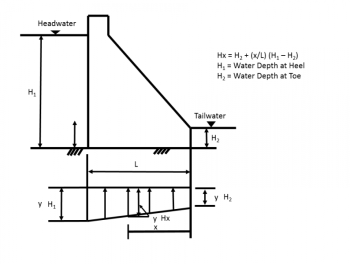Global Stability of a Dam: Difference between revisions
No edit summary |
No edit summary |
||
| Line 11: | Line 11: | ||
<!-- Introductory paragraph or topic page summary --> | <!-- Introductory paragraph or topic page summary --> | ||
When a dam impounds a body of water, it will experience a load or force commonly referred to as hydrostatic pressure. A variety of other forces such as uplift pressure, earth pressure, silt pressure, wave pressure, wind pressure, ice pressure, [[seismic]] acceleration, hydrodynamic pressure, and thermal stress from ambient temperature changes can also act on the dam depending upon site conditions. Global [[stability]] refers to the ability of the dam to withstand all design loading conditions with adequate safety margin. This is a function of the geometry and material properties of the dam as well as the magnitude and combination of loads acting on the structure. | When a dam impounds a body of water, it will experience a load or force commonly referred to as hydrostatic pressure. A variety of other forces such as uplift pressure, earth pressure, silt pressure, wave pressure, wind pressure, ice pressure, [[seismic]] acceleration, hydrodynamic pressure, and thermal stress from ambient temperature changes can also act on the dam depending upon site conditions. Global [[stability]] refers to the ability of the dam to withstand all design [[Loading Conditions|loading conditions]] with adequate safety margin. This is a function of the geometry and material properties of the dam as well as the magnitude and combination of loads acting on the structure. | ||
==Required Data== | ==Required Data== | ||
| Line 32: | Line 32: | ||
==Best Practices Resources== | ==Best Practices Resources== | ||
{{Document Icon}} [[Design Standards No. 13: Embankment Dams (Ch. 13: Seismic Analysis and Design) | Design Standards No. 13: Embankment Dams (Ch. 13: Seismic Analysis and Design), USBR, 2015]] | {{Document Icon}} [[Design Standards No. 13: Embankment Dams (Ch. 13: Seismic Analysis and Design) | Design Standards No. 13: Embankment Dams (Ch. 13: Seismic Analysis and Design), USBR, 2015]] | ||
{{Document Icon}} [[Earthquake Design and Evaluation of Concrete Hydraulic Structures (EM 1110-2-6053) | Earthquake Design and Evaluation of Concrete Hydraulic Structures (EM 1110-2-6053), USACE, 2007]] | {{Document Icon}} [[Earthquake Design and Evaluation of Concrete Hydraulic Structures (EM 1110-2-6053) | Earthquake Design and Evaluation of Concrete Hydraulic Structures (EM 1110-2-6053), USACE, 2007]] | ||
{{Document Icon}} [[Stability Analysis of Concrete Structures (EM 1110-2-2100) | Stability Analysis of Concrete Structures (EM 1110-2-2100), USACE, 2005]] | {{Document Icon}} [[Stability Analysis of Concrete Structures (EM 1110-2-2100) | Stability Analysis of Concrete Structures (EM 1110-2-2100), USACE, 2005]] | ||
| Line 45: | Line 38: | ||
{{Document Icon}} [[Gravity Dam Design (EM 1110-2-2200) | Gravity Dam Design (EM 1110-2-2200), USACE, 1995]] | {{Document Icon}} [[Gravity Dam Design (EM 1110-2-2200) | Gravity Dam Design (EM 1110-2-2200), USACE, 1995]] | ||
{{Document Icon}} [[Arch Dam Design (EM 1110-2-2201) | Arch Dam Design (EM 1110-2-2201), USACE, 1994]] | {{Document Icon}} [[Arch Dam Design (EM 1110-2-2201) | Arch Dam Design (EM 1110-2-2201), USACE, 1994]] | ||
{{Document Icon}} [[Design of Small Dams | Design of Small Dams, USBR, 1987]] | {{Document Icon}} [[Design of Small Dams | Design of Small Dams, USBR, 1987]] | ||
Revision as of 16:54, 14 December 2022

|
| Learn more about the need to consider uplift pressure when designing a gravity structure at DamFailures.org |
When a dam impounds a body of water, it will experience a load or force commonly referred to as hydrostatic pressure. A variety of other forces such as uplift pressure, earth pressure, silt pressure, wave pressure, wind pressure, ice pressure, seismic acceleration, hydrodynamic pressure, and thermal stress from ambient temperature changes can also act on the dam depending upon site conditions. Global stability refers to the ability of the dam to withstand all design loading conditions with adequate safety margin. This is a function of the geometry and material properties of the dam as well as the magnitude and combination of loads acting on the structure.
Required Data
Evaluation Criteria
Types of Analyses
Examples
![]() Learn more about the need to consider uplift pressure (DamFailures.org)
Learn more about the need to consider uplift pressure (DamFailures.org)
![]() Learn from the critical oversights that led to the failure of St. Francis Dam (DamFailures.org)
Learn from the critical oversights that led to the failure of St. Francis Dam (DamFailures.org)
Best Practices Resources
![]() Design Standards No. 13: Embankment Dams (Ch. 13: Seismic Analysis and Design), USBR, 2015
Design Standards No. 13: Embankment Dams (Ch. 13: Seismic Analysis and Design), USBR, 2015
![]() Earthquake Design and Evaluation of Concrete Hydraulic Structures (EM 1110-2-6053), USACE, 2007
Earthquake Design and Evaluation of Concrete Hydraulic Structures (EM 1110-2-6053), USACE, 2007
![]() Stability Analysis of Concrete Structures (EM 1110-2-2100), USACE, 2005
Stability Analysis of Concrete Structures (EM 1110-2-2100), USACE, 2005
![]() Roller-Compacted Concrete (EM 1110-2-2006), USACE, 2000
Roller-Compacted Concrete (EM 1110-2-2006), USACE, 2000
![]() Gravity Dam Design (EM 1110-2-2200), USACE, 1995
Gravity Dam Design (EM 1110-2-2200), USACE, 1995
![]() Arch Dam Design (EM 1110-2-2201), USACE, 1994
Arch Dam Design (EM 1110-2-2201), USACE, 1994
![]() Design of Small Dams, USBR, 1987
Design of Small Dams, USBR, 1987
Trainings
![]() On-Demand Webinar: Rehabilitation of Concrete Dams
On-Demand Webinar: Rehabilitation of Concrete Dams
![]() On-Demand Webinar: Stability Evaluations of Concrete Dams
On-Demand Webinar: Stability Evaluations of Concrete Dams
![]() On-Demand Webinar: Analysis of Concrete Arch Dams
On-Demand Webinar: Analysis of Concrete Arch Dams
![]() On-Demand Webinar: Introduction to Concrete Gravity Dams
On-Demand Webinar: Introduction to Concrete Gravity Dams
Citations:
Revision ID: 5670
Revision Date: 12/14/2022
